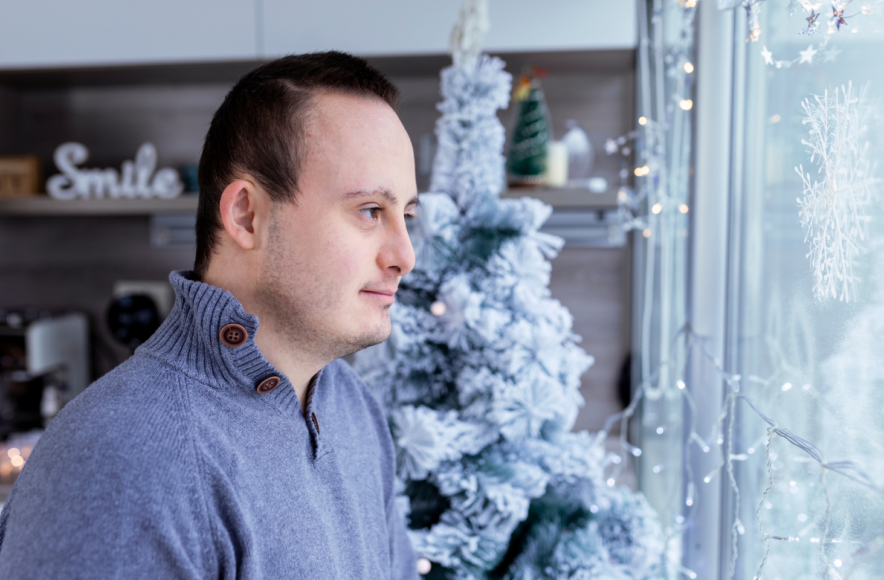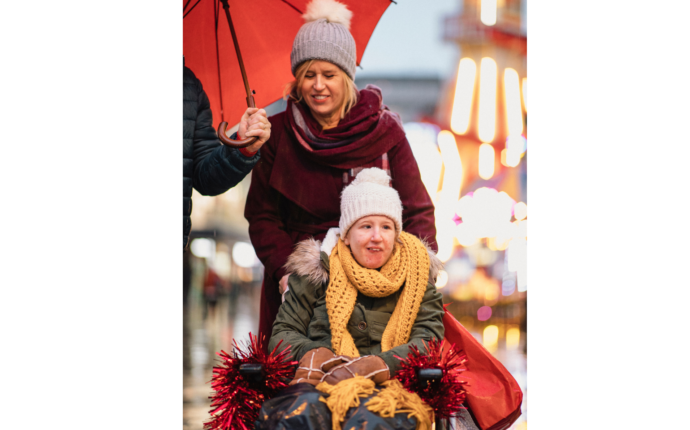5 tips for a Christmas that works for everyone

For many, Christmas provides a welcome means of coping with the dark and cold of winter.
For others it provides a reliable opportunity to socialise with family and friends and a break that marks the turn of the seasons towards the New Year and longer, warmer, days.
For some, it can be a time to reflect, renew and celebrate with their faith community.
The Christmas challenge
Under the surface, the festive season comes with expectations attached: to enjoy glittering lights and crowded markets; to relish surprises hidden in brightly coloured paper; to relax into a different (or no) routine; to welcome unexpected invasions of guests and substantial changes to the look and feel of the environment at home and elsewhere.
The changes that come with Christmas can make it a difficult time for people with a learning disability, autism or mental health needs to cope with, never mind enjoy.
The disruption to structures, combined with the potential for sensory and arousal overload, can lead to escalating levels of anxiety and distress.
We’ve combined advice from a range of sources – including people we support, their families and support workers – into some tips for anyone supporting adults, and to help make this season easier for everyone.
Our top five tips for a person-centred Christmas
- Prepare early and communicate well
Try to plan ahead so that you can foresee the disruption to routines and transport that Christmas closures might bring.
By getting your plans set early, you also might be able to arrange staggered visits from family and friends, rather than too many people at once.
Using a visual timetable helps communicate together about how time passes, and how events and activities will pan out in the run up to Christmas.
Use photos of people and from previous Christmases to illustrate events and locations, and aim to include the ‘everyday normal’ amidst the seasonal activities.

- Manage expectations – person-centred, not tradition-centred
Everyone has the right to enjoy this time of year. But not everyone can, or wants to, cope with the ways they’re “supposed” to enjoy Christmas.
There are a lot of assumed, uncommunicated expectations about how to have a good Christmas.
It can be fun to enjoy tradition, but try to encourage everyone involved to see that a Christmas ‘done right’ is poor alternative to a non-traditional Christmas that everyone enjoys.
For example – if somebody has routinely enjoys a simple sandwich lunch at midday all year round and would find changing that distressing, why change it for a ‘proper’ Christmas dinner? People are more important than traditions.
- Look for the quieter moments
The rush and buzz of Christmas is best enjoyed in measured doses; a little extra planning can reveal some satisfying quiet moments that are alternatives or respites from the noise and lights.
Seek out the quieter times in supermarkets (or find one with a sensory-friendly hour) and book a table in advance in a quieter area of a café. Think about preserving undecorated areas of the house and choose the calmer settings on lights.
Perhaps most crucially, plan periods of downtime during the busy season to recharge. Make sure everyone feels empowered to retreat back to quiet spaces when needed, or change plans when they’re not working.

- Surprises don’t suit everybody
Understanding how a person will react to the unexpected can make a big difference.
For some, opening wrapped presents and coping with the expectations of people watching for a positive reaction to the surprise can be exhausting. If you suspect this could be difficult for someone, you could tell them in advance what you’ve bought, use see-through wrapping paper or don’t wrap the gift at all – even if that doesn’t feel ‘right’ to you.
If everyone is supported to play a part in making changes such as decorating the house, the shared experience of doing it together could far outweigh the thrill of a big reveal, and remove the disorientating surprises.
- Gradual, rather than ‘big bang’
Consider making gradual changes to the physical environment, adding any decorations over time so people can get used to them, or putting the tree up undecorated for a few days before adding to it.
The long-build up, high expectation and challenging social situations at Christmas can leave us all feeling flat after it’s all over. Plan positive events afterwards to look forward to, and consider retaining a Christmas area in the house for a few weeks.
What works in your family?
We’d love to hear what’s worked for you – tag us or leave a comment on our Facebook, Twitter or Instagram with your best festive tips.
Happy person-centred Christmas!
- John Ockenden is Practice Development Co-ordinator for United Response.
Our guide to a person-centred Christmas, with free template resources and practical strategies for managing the season can now be downloaded here.
This content is part of our Christmas2021 series.